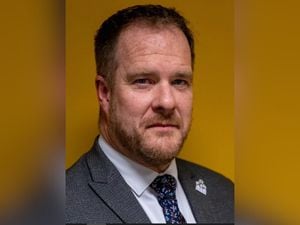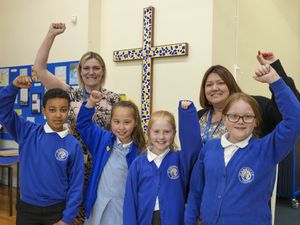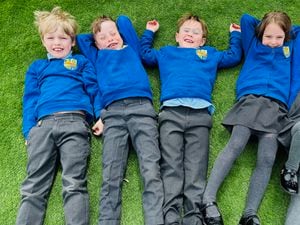Schools praised for hard work as pandemic leads to 1.5m lost days of face-to-face teaching
Education chiefs say schools in the region worked "tremendously hard" to minimise the impact of Covid-19 on pupils – after figures revealed more than 1.5 million days of face-to-face teaching were lost in the region during the autumn term.

Schools across the Black Country and Staffordshire put in a variety of measures including further remote learning – as pupils were forced to self-isolate for confirmed cases in their school bubbles.
New Department for Education figures show that pupils in Staffordshire missed the equivalent of 543,966 days of in-person education between September and December for this reason. It was an absence rate of 7.4 per cent – and equivalent to roughly five days per pupil.
During the same time period, pupils in Sandwell missed the equivalent of 458,279 days of in-person education. It was an absence rate of 13 per cent – among the highest in England – and equivalent to roughly nine days per pupil.
In Dudley, pupils missed the equivalent of 267,004 days of in-person education between September and December for this reason. It was an absence rate of 9.5 per cent and equivalent to roughly six days per pupil.
The figures show that pupils across Walsall missed the equivalent of 262,006 days of in-person education. It was an absence rate of nine per cent – and equivalent to roughly six days per pupil.
And in Wolverhampton, pupils missed the equivalent of 252,808 days of in-person education between September and December for this reason. It was an absence rate of 9.4 per cent and equivalent to roughly six days per pupil.
The figures include state-funded primary, secondary and special schools in the area.
Schools recorded general absence – including when authorised and unauthorised – separately, although this could include a child being ill due to having Covid-19.
Jonathan Price, Staffordshire County Council’s cabinet member for education, said: “Our schools have been working tremendously hard to minimise the impact of Covid-19 on their pupils, and have gone above and beyond to provide lessons face-to-face and online to ensure studies can continue.
"Throughout the pandemic we have seen Staffordshire schools put in a variety of measures to help stop the spread of Covid-19, embrace new technologies to ensure lessons can still go ahead, and have worked closely with our outbreak team to deal with any positive cases in school.
“Cases of Covid-19 in schools reduced significantly throughout the last lockdown. As the country opens up, we are seeing a small impact in schools and these are being dealt with on a case-by-case basis. We continue to work closely with all local schools to ensure they have the advice and guidance they need to deal with any outbreaks as they occur.”
Councillor Ruth Buttery, Dudley Council's cabinet member for children and young people, said: “Our priority throughout the pandemic has been to do all we can to ensure that all pupils in Dudley borough are able to go to school.

“Since September last year, when pupils returned to school after the first lockdown, there have been times when schools have been closed for short periods of time due to staff absence, or year bubbles have been sent home to isolate due to positive cases within their year group. Such measures have been few and far between and have always been a last resort.
“And even though pupils may not have been in school, teachers have worked magnificently to try and make sure they do not fall too far behind by continuing to provide online learning support when it is needed because pupils have not been able to be physically present."
Councillor Mike Hardacre, Wolverhampton Council’s cabinet member for education, skills and work, said: "The pandemic has had a similar impact on education in Wolverhampton as we have seen across the rest of the country. Whilst our schools and teachers have adapted to these challenges and delivered remote learning, the net results has been a significant loss of face-to-face teaching time between March last year and March this year.
"Since the return to classrooms, we are not seeing many year bubbles isolating because schools are carrying out effective contact tracing, which has reduced the number of pupils missing school.
"In the first half of this summer term we have seen school attendance at its highest level since the pandemic began. More than 95 per cent of primary and 90 per cent of secondary pupils are now back in school in Wolverhampton, as are nearly 86 per cent of pupils in other provision. Overall, 92.31 per cent of pupils are in attendance in Wolverhampton, above both the regional and national average."
A spokesman for children's services at Walsall Council said: "Walsall data indicates that school absence figures in Walsall during the peak period of the most recent lockdown were 5.3 per cent. During the 2019 – pre-lockdown period – the figure for school absences was recorded at five per cent. Our figures therefore indicate that absences were relatively low for this peak period of lockdown.
"Walsall schools continue to work closely with public health on Covid-19 related matters including symptoms-reporting, consequent monitoring and the tracing of suspected cases.
"Every pupil who is required to self-isolate at home is offered remote teaching of their curriculum. Schools themselves decide on how this is delivered and every school is different. Generally a combination of approaches mean that pupils are taught and learn remotely from worksheets, educational apps and video lessons, which may be live or pre-recorded.
"Schools have faced challenging circumstances during a very difficult and pressured time. We would like to thank all Walsall schools for their ongoing commitment to ensuring Covid-secure measures in their settings to provide a safe and positive learning environment for all."
Councillor Karen Simms, Sandwell Council’s cabinet member for best start in life, said: “Sandwell’s schools have provided excellent remote learning during the pandemic, and parents and carers have worked hard to support their children’s learning at home.
“However, this does not replace the learning that has been lost as a result of the pandemic. Different children will need different levels of support and schools will be well-placed to assess what additional help will work best for each child.
“In terms of how schools, pupils and staff will respond to an extended school week, this will depend on the details of the government’s proposals and it’s too early to comment at this stage.
“Sandwell schools have continued to provide good support to children during the pandemic, both within school, through remote learning and other direct support into family homes.
“With Covid absences and remote teaching, schools have had to plan their resources well, so that teaching in school and remote learning can both be provided.
“Attendance overall has been in line with national averages but there has been a need for self-isolation at various times. We continue to encourage Sandwell residents to ensure that they are vaccinated so that everyone can be protected.”





